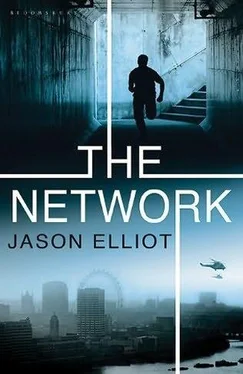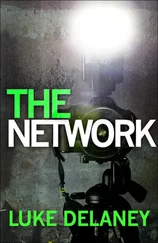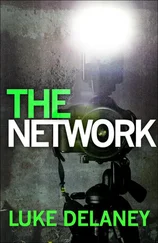Jason Elliot - The Network
Здесь есть возможность читать онлайн «Jason Elliot - The Network» весь текст электронной книги совершенно бесплатно (целиком полную версию без сокращений). В некоторых случаях можно слушать аудио, скачать через торрент в формате fb2 и присутствует краткое содержание. Жанр: Триллер, на английском языке. Описание произведения, (предисловие) а так же отзывы посетителей доступны на портале библиотеки ЛибКат.
- Название:The Network
- Автор:
- Жанр:
- Год:неизвестен
- ISBN:нет данных
- Рейтинг книги:4 / 5. Голосов: 1
-
Избранное:Добавить в избранное
- Отзывы:
-
Ваша оценка:
- 80
- 1
- 2
- 3
- 4
- 5
The Network: краткое содержание, описание и аннотация
Предлагаем к чтению аннотацию, описание, краткое содержание или предисловие (зависит от того, что написал сам автор книги «The Network»). Если вы не нашли необходимую информацию о книге — напишите в комментариях, мы постараемся отыскать её.
The Network — читать онлайн бесплатно полную книгу (весь текст) целиком
Ниже представлен текст книги, разбитый по страницам. Система сохранения места последней прочитанной страницы, позволяет с удобством читать онлайн бесплатно книгу «The Network», без необходимости каждый раз заново искать на чём Вы остановились. Поставьте закладку, и сможете в любой момент перейти на страницу, на которой закончили чтение.
Интервал:
Закладка:
‘Let’s leave now,’ I say.
‘What, today? What’s the hurry? You need to rest.’
‘No. We pick up the men and leave without warning them. That way no one has time to talk.’
‘Are you serious? Let’s have a look at you.’
I sit on the edge of the bed and H inspects the deep-red welts that run across my back and stomach. Dark bruises are beginning to extend along them. The skin isn’t broken, but it looks as though I’ve had an unusual accident with a very large barbecue. I wonder if they’ll leave scars.
‘Give it another day,’ he suggests.
Then we make a new discovery. I ask H to retrieve the first aid kit for me, which is with our stash of equipment in the roof space. I remember at the last minute to give him my phone so that he can check the markings I’ve left on the bags and cases with the ultraviolet light. He returns with the first aid kit, but there’s a new expression on his face.
‘How did you mark the stuff?’ he asks.
‘Vertical lines across the front that join up with the floor.’
‘Well,’ he says, ‘either there’s a bloody great Afghan rat in that attic or someone’s been poking around in there. None of the lines match up.’
We’ve both been out of the house over the past few days. It’s possible that a determined visitor could have taken an interest in our stuff. We call downstairs to the chowkidar, who says there have been no visitors but that he’s had to leave the house at times.
‘I didn’t check the doors when I got back yesterday. I was too distracted.’
‘Yes,’ he agrees, ‘you were a bit out of it.’
It’s an unpleasant feeling. There’s nothing for it but to recheck every piece of our equipment and all the supplies in the G. We start with the kit in the attic, hauling it down into the room and scrutinising every item minutely for any signs of tampering. H even inspects each individual round of ammunition for the Brownings. It’s all there, along with everything else, and none of it seems to have been interfered with.
Then we descend to the garage and unload everything from the G, paying particular attention to the explosives in case they’ve been altered in any way. H takes out every block of the plastic and smells it. We unwind the blasting fuse and I coil it over my arm as I inspect its length, and then rewind it onto its original spool. We do the same with the detcord. The detonators are intact.
If nothing is missing, then perhaps something has been added. Most likely is a bomb. Less probable is a transmitter to track our movements. Either one will take up a certain amount of space. We run our hands over every seam of the G’s interior, probing the seats, panels and carpets for any sign that they’ve been disturbed or modified. We check with minute care to see if there’s any indication of modified or extra wiring in the vicinity of the ignition or the panels around the dashboard. We lie on the ground with our torches and search the wheel arches and bumpers and chassis. Then we roll the G forward into the daylight to check under the bonnet, using a strip of paper to detect any tripwires before opening it fully. We peer into the fuel tank, radiator, reservoirs and lamp housings. Anything that can be readily removed and replaced, we remove and replace.
There is no bomb. There is no transmitter. No one seems to have installed a tilt switch that will go off when the car meets its first slope after leaving the house. Nothing is missing. I wonder, but not out loud, whether I could have accidentally moved the kit in the attic myself. I do not know.
It’s late afternoon. We spend the rest of the day packing, and agree to leave in the morning without telling the chowkidar or giving any advance warning to the other men. An envelope with a letter of thanks and a generous tip will express our appreciation.
Not long after sunrise, we drive to Mr Raouf, who’s not expecting us.
‘We have to leave immediately,’ I tell him. ‘I’m sorry.’
‘Moshkel nist,’ he says, no problem. He summons the other men on a two-way radio. While we wait for them to arrive, I ask if I can use his computer to check my email. He lifts a scarf from the keyboard, dusts off the screen with it and pulls back the chair for me, observing me wince as I sit. It’s an unpredictable process, and takes a dozen attempts before the modem finally connects. I log into the secure server maintained by the Firm, encrypt and send the contents of the flash drive using my own public encryption key, and ask Mr Raouf if he’ll keep the original for me in his safe, along with our second passports. What happens next is a surprise.
‘I have something for you,’ he says. From under his desk he pulls out an AK-74SU Kalashnikov with a folding stock, and presents it proudly to me.
‘For your journey,’ he says.
H’s eyebrows rise as Mr Raouf hands it over. It’s a compact automatic weapon which fires the 5.45-millimetre low-recoil round, and the barrel is much shorter than the AK-47. It can be easily hidden under a jacket and will fit snugly under a car seat, which makes it popular in Russia with special forces, drivers and bodyguards. It’s a generous gift because I suspect he’s deeply attached to such a rare and highly prized weapon, and I promise to return it to him on our return. He nods gravely as if to say ‘when you return’. At least I hope that’s what he means, and not ‘if you return’.
On journeys at home the road is a means to an end. It’s a featureless thing which doesn’t attract the greater part of your attention, and you take for granted that it won’t crumble to dust under your wheels as you while away the time with distracted thoughts, thinking of your final destination. You take for granted that your journey implies arrival.
In Afghanistan all this is reversed. The road demands your attention from the start. Every aspect of it requires effort and stamina and determination. It does, literally, crumble to dust under your wheels, and offers you no time for distracted thoughts. In the meantime your destination becomes an ever more abstract idea, a thing you doubt and question and wonder if you’ll ever reach, and as your journey lengthens you feel like a fool for blindly assuming that your eventual arrival is guaranteed. The road, in short, becomes the goal, and arrival a luxury.
Our caravan is made up of two vehicles. The trust’s white Toyota pickup leads the way, carrying Sher Del, Aref and Momen. H and I ride second in the G. Our doors and bonnets bear the vinyl stickers that Mr Raouf has supplied us with, so that our true purpose, like that of many a charitable institution operating in this part of the world, is amply disguised.
We drive through the devastated western suburbs under a brilliantly blue, clear sky. On the outskirts of the city the surfaced road ends. There was one, years before, but it’s simply been worn away. Now it’s a pale scar on which every vehicle lurches and weaves in a perpetual cloud of white dust. Which side to drive on is only an approximate convention.
Beyond the dust we can see the long chains of peaks to the north and south of the city. It’s late spring now and the mountains are draped in ice on their upper ridges, and lower down their snow-filled gulleys resemble the camouflage of a killer whale. It’s hard to believe that a country so beautiful is in the midst of a brutal conflict, and has been for years. But there’s always the ruined armoured vehicles, tilted at the verges of the road like ships that have run aground in the shallows and been abandoned, to remind us otherwise.
An hour west of the city centre the road divides. The route to the north-west leads up to Paghman and the southern towards Ghazni. We take the lower branch and move beyond Maidan Shahr, the natural pass that protects the city’s western flank. Then an hour later, at the next main junction, we turn into the mountainous folds of Wardak province, where the road deteriorates a stage further.
Читать дальшеИнтервал:
Закладка:
Похожие книги на «The Network»
Представляем Вашему вниманию похожие книги на «The Network» списком для выбора. Мы отобрали схожую по названию и смыслу литературу в надежде предоставить читателям больше вариантов отыскать новые, интересные, ещё непрочитанные произведения.
Обсуждение, отзывы о книге «The Network» и просто собственные мнения читателей. Оставьте ваши комментарии, напишите, что Вы думаете о произведении, его смысле или главных героях. Укажите что конкретно понравилось, а что нет, и почему Вы так считаете.












